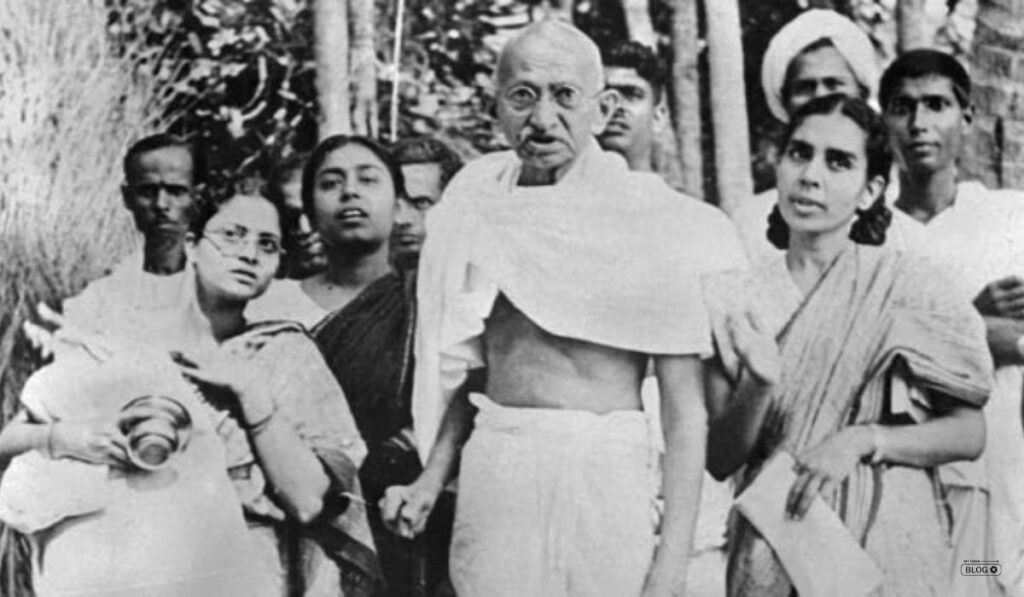On January 30, we solemnly honor the memory of Mahatma Gandhi, often referred to as the father of our nation. This day marks the unfortunate event of “mahatma gandhi death” in 1948 when he was killed by Nathuram Vinayak Godse, only a few months after India gained independence from British Rule. Despite the tragedy, Gandhi’s teachings of peace and non-violence persist as a source of inspiration globally, emphasizing the significance of unity and understanding in our collective journey towards a better future.
On the 76th year since Mahatma Gandhi passed away. let’s learn some interesting facts about him.
Mohandas Karamchand Gandhi, a famous advocate for peace and non-violence, was born on October 2, 1869, in Porbandar. When he was 13 years old, he got married to Kasturba. He studied law in London at the Inner Temple. In 1893, he went to South Africa for a legal case and stayed there for 21 years. During his time in South Africa. He started using non-violent resistance to fight for civil rights.
In 1915, Gandhi returned to India and began organizing farmers and urban laborers to protest against unfair treatment. He started movements like Satyagraha and Ahimsa to resist British colonial rule. His peaceful approach and ability to win people’s hearts with love and tolerance greatly influenced civil rights movements.

Gandhi dedicated his life not only to fighting for India’s freedom. But also to actively leading nationwide campaigns against untouchability and poverty. Additionally, he actively supported women’s rights.
On January 30, 1948, Mahatma Gandhi was on his way to a prayer meeting at Birla Bhavan in Delhi, around 5:17 pm. He was with his grandnieces. Sadly, Nathuram Godse, a Hindu nationalist, shot him three times in the chest. Mahatma Gandhi passed away instantly from the attack. This tragic event occurred while he was heading to an evening prayer session.
Gandhi’s 2024 Memorial: Significance
Mahatma Gandhi earned global renown for actively advocating peace and non-violence. His birthday, celebrated on October 2, holds special significance as the United Nations General Assembly, in 2007, actively granted global recognition, honoring Gandhi’s principles and teachings by designating it as the International Day of Non-Violence.
On this significant day, people come together to raise awareness about the importance of non-violence and its crucial role in fostering peace, harmony, and unity on a global scale. It’s a time for reflection and understanding how we can apply these principles in our lives and communities to build a more peaceful world. Mahatma Gandhi’s legacy continues to inspire generations, reminding us of the enduring power of non-violent action in creating positive change.
Godse and Gandhi’s Assassination: Historical Overview
Nathuram Vinayak Godse (May 19, 1910 – November 15, 1949) was the assassin of Mahatma Gandhi, who tragically shot Gandhi three times in the chest on January 30, 1948, at the Birla House in New Delhi. This event plays a pivotal role in the narrative of “mahatma gandhi death.” Godse, a Hindu nationalist from Pune, believed that Gandhi had supported the political demands of India’s Muslims during the partition.
In collaboration with Narayan Apte and six others, Godse orchestrated the plot to assassinate Gandhi. Following a year-long trial, Godse faced the consequences and was sentenced to death on November 8, 1949. This historical account sheds light on the complex circumstances surrounding Mahatma Gandhi’s death and the subsequent legal proceedings.
Mahatma Gandhi’s death Timimg and Place
At 5:17 PM on January 30, 1948, Gandhi was at Birla House.
In New Delhi, behind the mansion where Mahatma Gandhi stayed, Godse also made his way on foot through a raised lawn for a prayer meeting. He emerged from the crowd and shot three bullets into Gandhi’s chest, marking a tragic chapter in the Mahatma Gandhi death saga. Gandhi fell immediately, and the nearby crowd was shocked.
Herbert Reiner Junior, a 32-year-old Assistant Consul at the new American Embassy in Delhi, played a crucial role in apprehending Godse . Holding him by the shoulders and later witnessing his demise at the hands of soldiers. Reiner’s swift actions became a pivotal moment in the aftermath of Mahatma Gandhi death. They took Gandhi to his room in Birla House, where he passed away a few moments later, leaving a lasting impact on the course of history.
Conclusion
In commemorating Mahatma Gandhi on his death anniversary in 2024, we reflect on the enduring impact of his life and principles, especially in the context of Mahatma Gandhi’s death. Despite the tragic circumstances surrounding his passing, Mahatma Gandhi’s teachings of peace, non-violence, and unity persist as a guiding light for people worldwide. The legacy left behind by Mahatma Gandhi’s death extends beyond the sorrowful moment, serving as a reminder of his unwavering commitment to social justice, civil rights, and equality. His principles continue to inspire generations in their pursuit of a better future, making “mahatma gandhi death” a significant part of the narrative that shapes our understanding of history.
FAQs
Why is Mahatma Gandhi known as the father of the nation?
Mahatma Gandhi is often referred to as the father of the nation. Due to his pivotal role in India’s. Struggle for independence. His leadership and philosophy of non-violence played a significant part in shaping the nation’s path towards freedom.
What is the International Day of Non-Violence, and why is it celebrated on October 2?
The International Day of Non-Violence, observed on October 2, commemorates Mahatma Gandhi’s birthday. Designated by the United Nations in 2007, it aims to honor Gandhi’s principles. And promote non-violence as a means to achieve lasting peace and understanding.
How did Mahatma Gandhi contribute to civil rights movements in India and South Africa?
Gandhi actively organized and led civil rights movements. Particularly through non-violent resistance. In South Africa, he fought against discriminatory laws, and upon returning to India. He organized farmers and laborers to protest against injustice and discrimination.
What were Mahatma Gandhi’s key principles, and how did he apply them in his life?
Gandhi’s key principles included non-violence (Ahimsa), truth (Satyagraha), and love for all beings. He applied these principles in various movements against British colonial rule. Untouchability, and poverty, emphasizing the transformative power of peaceful, moral action.
How does Mahatma Gandhi’s legacy continue to influence the world today?
Mahatma Gandhi’s legacy endures in the promotion of non-violence, social justice, and human rights. Individuals and movements globally draw inspiration from his teachings, reminding us that we can achieve positive change through peaceful means and compassionate understanding.








